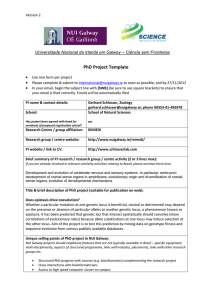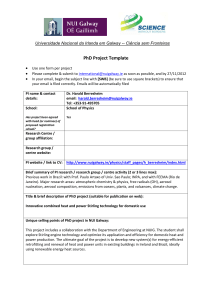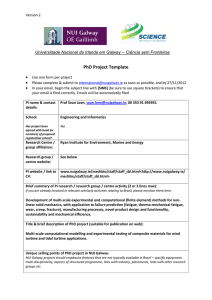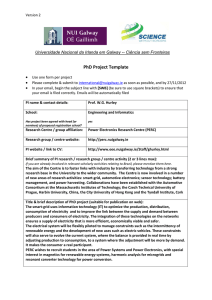PhD Project Template ,
advertisement
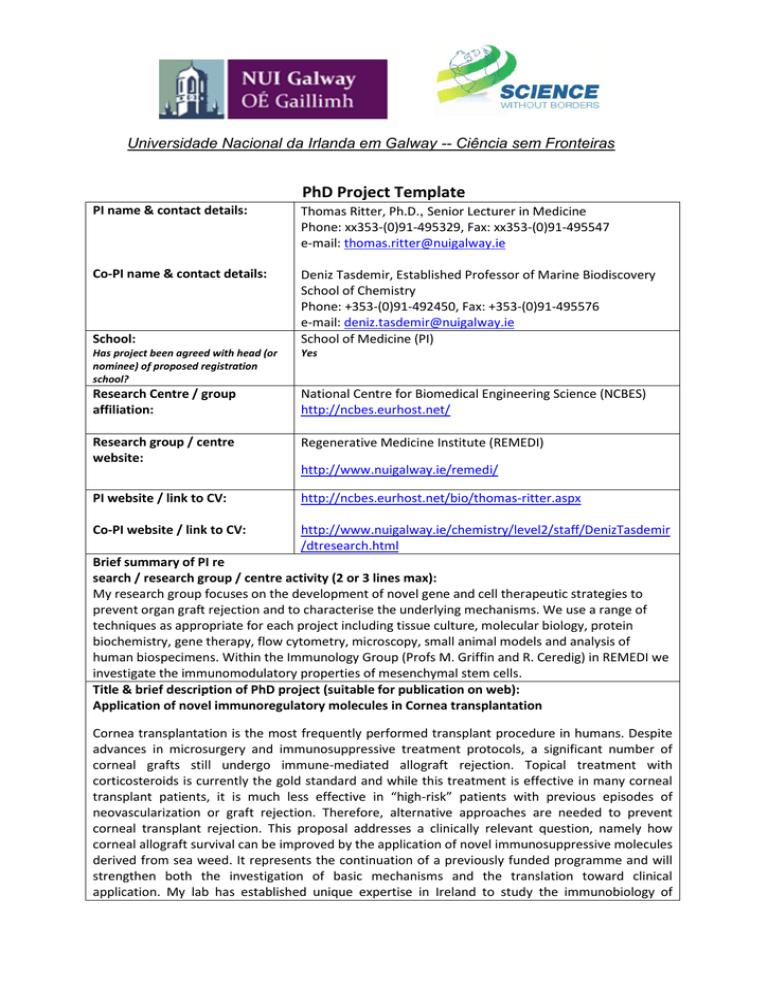
Universidade Nacional da Irlanda em Galway -- Ciência sem Fronteiras PhD Project Template PI name & contact details: Thomas Ritter, Ph.D., Senior Lecturer in Medicine Phone: xx353-(0)91-495329, Fax: xx353-(0)91-495547 e-mail: thomas.ritter@nuigalway.ie Co-PI name & contact details: Deniz Tasdemir, Established Professor of Marine Biodiscovery School of Chemistry Phone: +353-(0)91-492450, Fax: +353-(0)91-495576 e-mail: deniz.tasdemir@nuigalway.ie School of Medicine (PI) School: Has project been agreed with head (or nominee) of proposed registration school? Yes Research Centre / group affiliation: National Centre for Biomedical Engineering Science (NCBES) http://ncbes.eurhost.net/ Research group / centre website: Regenerative Medicine Institute (REMEDI) PI website / link to CV: http://ncbes.eurhost.net/bio/thomas-ritter.aspx Co-PI website / link to CV: http://www.nuigalway.ie/chemistry/level2/staff/DenizTasdemir /dtresearch.html http://www.nuigalway.ie/remedi/ Brief summary of PI re search / research group / centre activity (2 or 3 lines max): My research group focuses on the development of novel gene and cell therapeutic strategies to prevent organ graft rejection and to characterise the underlying mechanisms. We use a range of techniques as appropriate for each project including tissue culture, molecular biology, protein biochemistry, gene therapy, flow cytometry, microscopy, small animal models and analysis of human biospecimens. Within the Immunology Group (Profs M. Griffin and R. Ceredig) in REMEDI we investigate the immunomodulatory properties of mesenchymal stem cells. Title & brief description of PhD project (suitable for publication on web): Application of novel immunoregulatory molecules in Cornea transplantation Cornea transplantation is the most frequently performed transplant procedure in humans. Despite advances in microsurgery and immunosuppressive treatment protocols, a significant number of corneal grafts still undergo immune-mediated allograft rejection. Topical treatment with corticosteroids is currently the gold standard and while this treatment is effective in many corneal transplant patients, it is much less effective in “high-risk” patients with previous episodes of neovascularization or graft rejection. Therefore, alternative approaches are needed to prevent corneal transplant rejection. This proposal addresses a clinically relevant question, namely how corneal allograft survival can be improved by the application of novel immunosuppressive molecules derived from sea weed. It represents the continuation of a previously funded programme and will strengthen both the investigation of basic mechanisms and the translation toward clinical application. My lab has established unique expertise in Ireland to study the immunobiology of Universidade Nacional da Irlanda em Galway -- Ciência sem Fronteiras corneal transplantation and apply regenerative medicine and gene therapy approaches to improving the outcomes. In collaboration with the Co-PI, Prof Deniz Tasdemir (Marine Biodiscovery Group of NUIG) seaweed extracts will be purified and tested extensively in vitro. Preliminary data indicate that seaweed extracts inhibit TNF production of monocytes in a whole blood assay. Chemical components with low toxicity but high immunosuppressive activity will be further purified, characterised and applied (topically and systemically) in vivo in a rat corneal transplant model. Moreover immunosuppressive effects will be monitored in vivo by studying immune cell populations in various organs (graft, draining lymph nodes, spleen) of transplanted animals. Results are expected to identify novel patentable immunosuppressive molecules from seaweeds with strong potential for a clinical application in ocular surface disorders. Unique selling points of PhD project in NUI Galway: As a REMEDI member, the student will have access to the following: A number of core technical facilities in areas such as flow cytometry, microscopy, cell culture, histology, molecular biology etc A diverse range of additional subject-specific and non-specific didactic elements as part of the structured PhD programme (Regenerative Medicine Ph.D. programme). A wide range of expertise including the areas of stem cell biology, gene therapy, immunology, molecular biology, translational research A wide network of collaborating researchers in Ireland, Europe, the US and worldwide Collaboration with Marine Biodiscovery group and access to excellent chemistry infrastructure and training to develop natural products chemistry skills and drug discovery experience Name & contact details for project queries, if different from PI named above: Please indicate the graduates of which disciplines that should apply: Biomedical Sciences, Biology, Cell biology, Pharmacology Ciência sem Fronteiras / Science Without Borders Priority Area: Please indicate the specific programme priority area under which the proposed PhD project fits- choose only one (tick box): Engineering and other technological areas Pure and Natural Sciences (e.g. mathematics, physics, chemistry) Health and Biomedical Sciences Information and Communication Technologies (ICTs) Aerospace Pharmaceuticals Oil, Gas and Coal Renewable Energy Universidade Nacional da Irlanda em Galway -- Ciência sem Fronteiras Minerals Biotechnology Nanotechnology and New Materials Technology of prevention and remediation of natural disasters Biodiversity and Bioprospection Marine Sciences Creative Industry New technologies in constructive engineering Please indicate which of the following applies to this project (referring to Science Without Borders arrangements): Suitable only as a Full PhD (Y/N): _ ___Y_ Available to candidates seeking a Sandwich PhD arrangement (Y/N): ___N__. Suitable for either/Don’t know: _____
